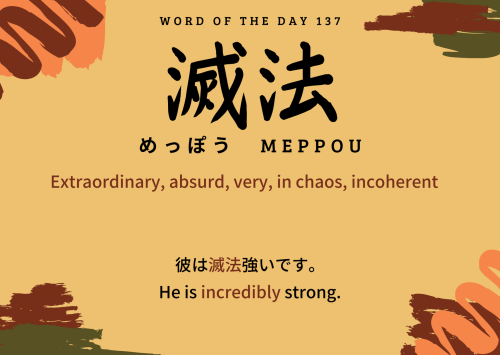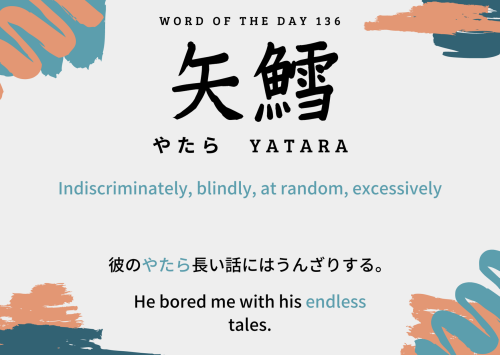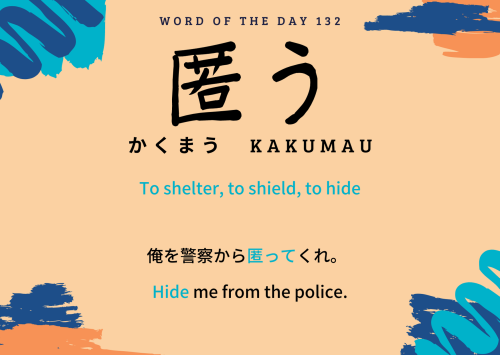#jlpt kanji
JLPT Level: Unlisted, but the kanji are N1 and N3 respectively.
Alright, this is a pretty interesting word that’s seen some changes in meaning and usage over the centuries.
滅
- On-yomi: metsu
- Kun-yomi: horo.biru, horo.bu, horo,bosu
- Meaning: destroy, ruin, overthrow, perish
法
- On-yomi: hou, ha, ho, furan
- Kun-yomi: nori
- Meaning: method, law, rule, principle, model, system
If we put the two together, we get “The Law of Destruction,” which could be a pretty rad metal song.
Originally, this was a Buddhist term used to refer to…something too hard for me to wrap my pea brain around haha. Really trying to remember everything I learned in that one Buddhist Philosophy course I took in uni back in the day.
Okay okay. Basically, all things in existence are divided into two categories:
- Conditioned existence (a.k.a. things created by fate). This is known as saṃskṛta in Sanskrit.
- Those that have transcended conditioned existence. This is known as asaṃskṛta in Sanskrit.
Meppou is the old Japanese Buddhist term for “things that have transcended conditioned existence.” This can mean that a thing has reached Nirvana, something that is “absolute.”
From that meaning, meppou came to mean something “extraordinary” or “terrible and intense” like a historic typhoon.
Most of the time, meppou is used in the phrase 滅法強い meppou tsuyoi, “terribly powerful.”
Post link
JLPT Level: N1, and the kanji are N1 and unlisted respectively.
Most of the time, this word is written in hiragana. But the kanji are funny, so I’m gonna talk about those too.
矢
- On-yomi: ya
- Kun-yomi: shi
- Meaning: dart, arrow
鱈
- On-yomi: setsu
- Kun-yomi: tara
- Meaning: codfish
So…put these two together and you get… “shooting codfish with arrows” and somehow that is supposed to mean “indiscriminately; blindly; at random; recklessly; thoughtlessly; excessively; profusely.”
I bet you’re ready for me to blow your mind with some anecdote from like 700 years ago about some old Japanese hermit who only had an arrow and spent everyday in the same stream trying to catch cod unsuccessfully, because he was an idiot and didn’t know that cod were an ocean fish and not a freshwater fish.
…But actually, these are just ateji. Ateji are kanji whose meaning have nothing to do with the word they are used in. Their pronunciation just conveniently matches the word. So “arrow” and “codfish” have absolutely nothing to do with yatara and its meaning.
Kanji, man. Can’t trust ‘em. :P
Post link
JLPT Level: Unlisted, but the kanji is N1
This has an etymology different from what I had expected. Let’s look at the parts!
⼖ to conceal, hide
若 soft mulberry leaves
Now, anyone who has been studying their kanji is probably looking at that definition of 若 and going, “Omoi-no-hoka, you’ve lost the plot” because 若 means young.
And see, I knew that it meant “young” too, so I thought maybe this was a reference to something like “protect the women andchildren.”
But nope! This, my friends, is all in reference to silkworms.
Silk was an incredibly important textile in Japan. The silkworms live in mulberry trees, eating the young, soft leaves. 匿 represents the mulberry leaves that fill up the silkworms’ bellies and stay hidden there.
Kinda weird, but there ya go!
Post link



